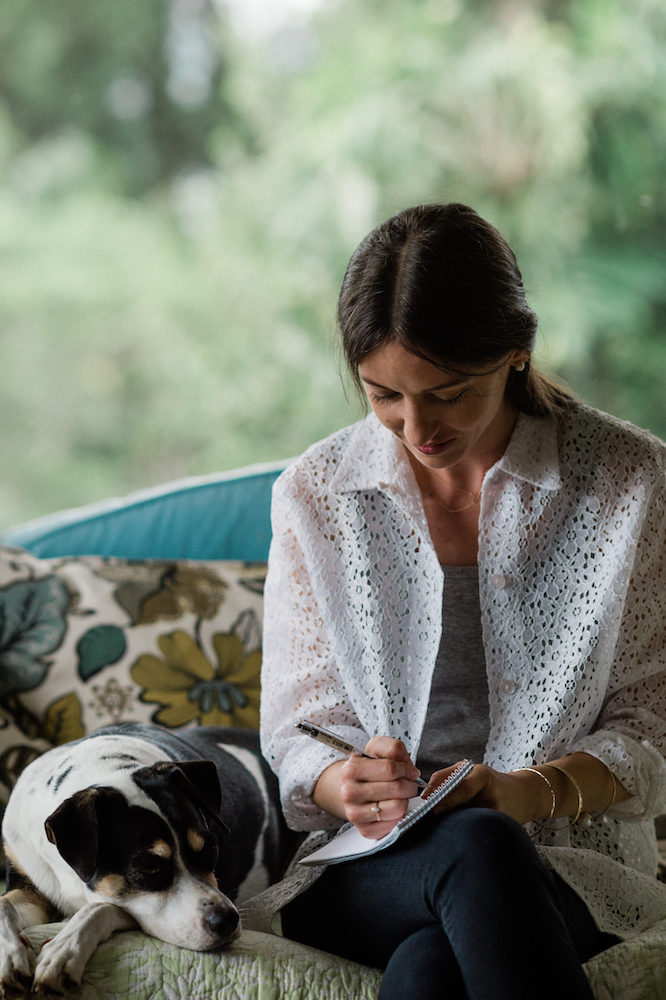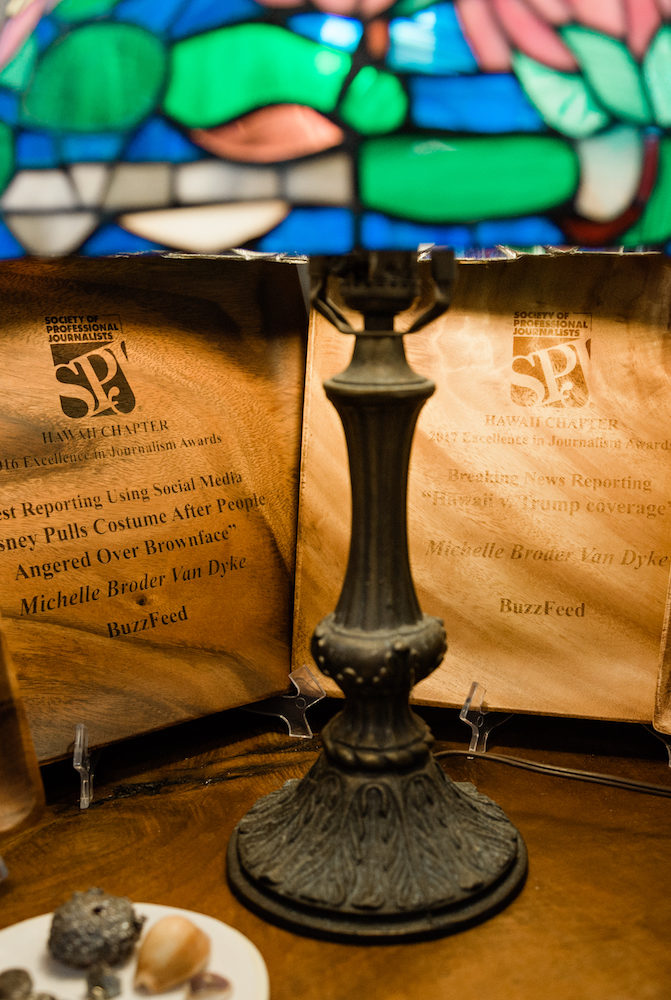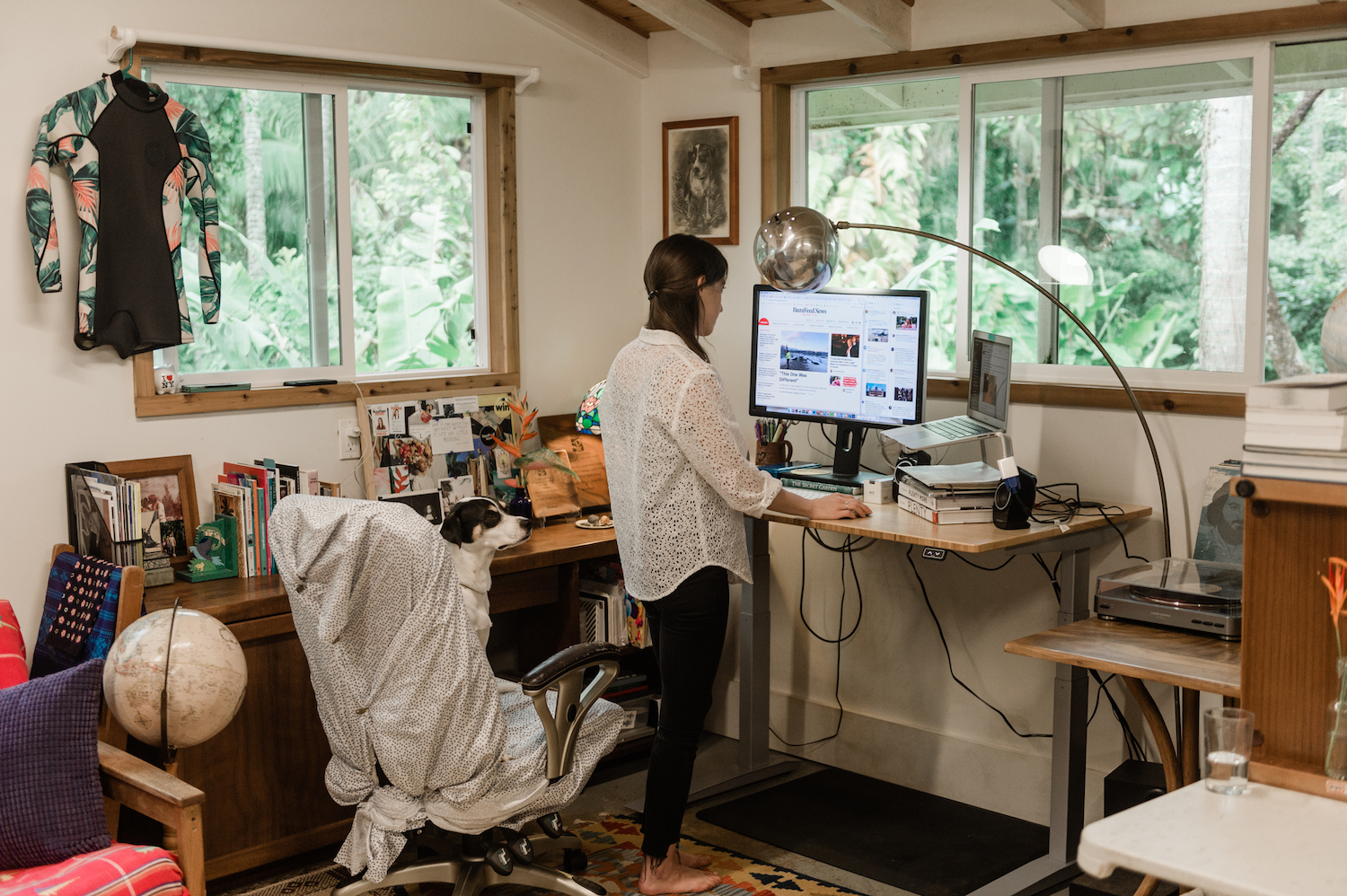Images by John Hook
Tucked away from the road that winds up Mount Tantalus, Michelle Broder Van Dyke’s secluded childhood home stares over Diamond Head and straight onto the ocean. Located on the six-acre property is a small garage-like structure adjacent to the house, which serves as the office of Broder Van Dyke and her artist husband Chris Ritson. Here, patterned carpets cover the floor. A record player sits next to vinyl records of Nina Simone and The Beach Boys. A grayscale portrait of their dog Kōlea hangs above a desktop computer.
This is where Broder Van Dyke works as a freelance journalist and formerly clocked in as the remote night editor of the scrappy media site BuzzFeed. (Her six-year BuzzFeed career ended earlier this year when she was laid off in a round of staff cuts at media outlets felt around the country.) Since night begins on the U.S. East Coast, as the day in Hawai‘i reaches its zenith, Broder Van Dyke has unique positioning in the national news cycle. Instead of pulling an all-nighter to keep up with current events, she starts her day mid-morning.
One person who has made such shifts pertinent is President Donald Trump, who has an affinity for tweeting late at night. But as the night editor of BuzzFeed, Broder Van Dyke also fed the outlet newsworthy events happening in Hawai‘i under her watch, such as the state being the first to ban the sale and distribution of reef-destroying sunscreens. She felt compelled to tell stories that accurately represented Hawai‘i after she moved back home to O‘ahu. “I think it says a lot that so much is happening here,” Broder Van Dyke says. “It kind of reaffirmed my feeling that Hawai‘i is important and we need to make sure these stories get covered too.” As a freelancer, she continues to indulge in her deep connection to the islands and give voice to local communities in the national news.


Broder Van Dyke graduated from Punahou School in 2004 and, struck with a case of island fever, set out for Ohio to attend Oberlin College. Then, yearning for something more urban after graduation, she packed her bags for San Francisco. Having written all her life—letters to her grandmother on the continent, short books when she was in grade school—Broder Van Dyke knew she wanted to make a career of it. Media was struggling at the time, but she snagged an internship at the Bay Guardian. After that, she worked at a local bookstore to make ends meet while writing a music column for the San Francisco Chronicle.
Ready to formalize her skills, Broder Van Dyke crossed the country to attend Columbia University Graduate School of Journalism. Then she moved back to Honolulu, where she freelanced for Civil Beat and became a stringer for the New York Times, covering Senator Mazie Hirono and the infamous catfishing of football player Manti Te‘o. “That put this idea in my mind that these national publications might want to cover certain things about Hawai‘i,” she says.
Her most hectic year yet was 2018. It started with the January 13 false missile alert. With the topic literally close to home, Broder Van Dyke wrote a personal essay for BuzzFeed reflecting on the panic and potential loss of her childhood home. “That was just an interesting intersection because I was on the breaking news team, so I was already used to covering fast-paced things, but all of a sudden it became totally personal,” she says. “I thought I was going to die.” She also covered the hurricanes that threatened the Hawaiian Islands and flew to Hawai‘i Island to report on the Kīlauea lava flow, which displaced communities and forced people from their homes.

Broder Van Dyke calls her layoff a learning lesson that reaffirms the importance of journalism, “now more than ever,” she says. The experience has also helped her realize she wants to report longer, more investigative pieces. On her mind right now are stories connected to the islands, like Mark Zuckerberg, Hawai‘i’s land rights, and issues pertaining to climate change. In her fantasies, those stories will one day become a book. But for now, she’s taking it one story at a time.
—
How to Be Media Literate
If you think reading the news cycle is exhausting, imagine working in it — or as Broder Van Dyke phrased it, “being deep in the trenches.” In a world where digital news spreads fast, it’s up to Broder Van Dyke and her journalist counterparts to fact check the information she publishes for accuracy. “In this climate, where we see politics just changing a lot, it’s so important that the media is fact-checking,” she says. “There is so much information that swirls, that is false, and it can be uncanny how these people you know who are really smart people are still sharing them and not thinking more deeply about it.”
Be conscious
“Be particular about who you follow,” Broder Van Dyke says. “Even my husband will be like, ‘Oh, it was in the Washington Post or whatever,’ and no, that was in the Washington Times. It isn’t the same thing. It’s so subtle and they’re trying to trick you.” Although there’s no perfect publication, stick to the most reputable and objective websites.
Support your news organizations
More news outlets are having membership programs to help them continue what they do best. Broder Van Dyke suggests supporting both local and national publications. “We can’t break these news stories without resources.”
Debunk misinformation
At BuzzFeed, there’s an entire section dedicated to debunking trending Internet stories. Aptly called “Debunked,” these explainer articles make it easier to decipher what’s real and what’s not. “Instead of explaining it to my great aunt, I can just share this,” Broder Van Dyke says.
Seek the truth
“I know people see things and it reinforces their bias, so they’re almost not looking for the truth,” she says. Keep your own biases in mind when you seek out and consume the news.

